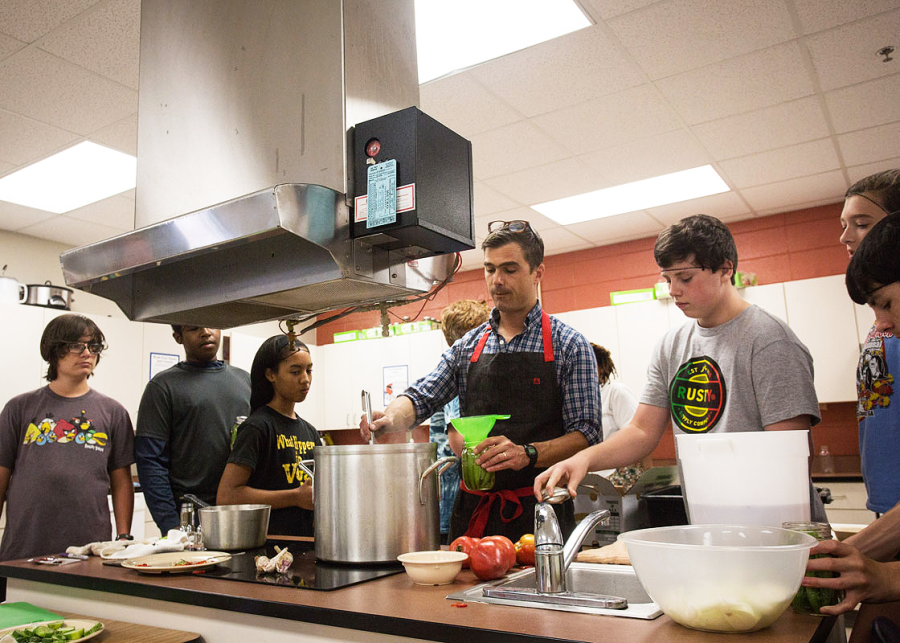Bring Home Home Economics
If you ask most members of the Boston Latin School graduating class to find the derivative of arcsin[ln(6x^2)] or to identify the chiasmus in a line of Cicero’s In Catilinam, many will answer with ease. But ask them how to change a tire, create a 401(k) or poach an egg, and they will likely whip out their phones for assistance. This is an issue that needs to change and it starts in the classroom.
The root of this issue is that “adult skills,” such as cooking, sewing or budgeting, which were once taught at home or school, are disappearing from both places. Home economics teaches students how to successfully run a household; for instance, Shop teaches woodworking and metalworking. So, why are such important and necessary lessons being removed from the curriculum?
In fact, these classes and lessons were once mandatory in most schools. Ever since institutions segregated by gender-reinforced sexist roles, however, these classes have lost popularity over the past 50 years. This, combined with America’s shift to prioritize STEM subjects, has led to the classes’ sharp decline. Even their rebranding to Family and Consumer Services (FCS) has not stopped the 38 percent decline in enrollment in the last decade alone, according to NPR. With the rise of dual-income households, moreover, these skills are less likely to be taught at home.
This produces appalling results. Students leave BLS for college well-prepared for academics, but not for life. BLS art teacher Mr. Joseph Carrigg recalls that a colleague of his from Massachusetts College of Art and Design told him that “decades ago, the kids doing sculpture knew how to use tools because they cut the lawn, did the shrubs, painted the porch with their parents. And now, the kids arrive at MassArt and say, ‘Which way do I turn the bolt?’”
Many students avoid exercising crucial life skills by outsourcing labor. Need dinner? Get takeout. Ripped your jacket? Buy a new one. Need to replace a tire? Call a specialist.
Such tendencies create excessive waste and expenses, harming both the environment and the individual. Furthermore, a reliance on frozen and restaurant food fuels the country’s obesity epidemic. Even resources such as YouTube and Blue Apron that allow one to complete tasks on their own do not force one to internalize information. As a result, people have lost a sense of self-sufficiency and become reliant on outside sources to accomplish basic tasks.
Advocating for FCS at BLS would alleviate this issue. Since BLS is a college preparatory school, some might view FCS as useless for BLS students’ futures, but Fiber Arts Club President Adriana Passacantilli (II) argues, “There should be a home [economics] course at BLS. Life skills — knitting, crocheting, being able to make your own stuff — are important no matter if you’re going to college or not.” Everyone has to cook, clean and manage their money as an adult, so everyone needs to be trained in these things.
In fact, ancient Greek education, which many of BLS’s courses are rooted in, emphasized training the body along with the mind, and recognized that a purely academic education builds weak and unresourceful people. Furthermore, for students from low-income or immigrant families, many of whom are tasked with cooking or navigating the family’s finances, learning FCS in school would help them complete these tasks more efficiently and allocate them more time to focus on academics, easing the cycle of poverty.
Finally, these courses would address the teen mental health crisis because they are hands-on, away from screens and often relaxing. Doing something physical after six periods of sitting in class and staring at a computer would bring life back to many burnt out students. Recent methods to address student mental health at BLS, such as breathing exercises and W block workshops, are so in-your-face that they aren’t always effective. FCS doesn’t scream “This is good for your mental health!” but rather subtly provides students with a variety of mental and physical benefits.
At BLS, FCS can begin as a series of W block lessons for seventh and eighth graders. Cooking classes can begin with activities that do not require stoves, such as pickling vegetables. Fiber arts and finances can be taught anywhere.
But Mr. Carrigg adds, “[The classes] would be a challenge. I mean, you have a kitchen down there, but how do you get the permission to bring in a pilot program? It would be a matter of funding.” On the topic of funding, the state needs to invest more into FCS, and the Department of Elementary and Secondary Education would have to add FCS as a marker of educational excellence, incentivizing teachers to enter an FCS track and provide schools the funding to implement programs.
Common Core has been a big failure for education in Massachusetts, and it is time for something new. The beneficial aspects of FCS must be separated from its sexist past and be revived. Students would become more practical and resourceful, and ultimately, gain the abilities to truly THRIVE.







